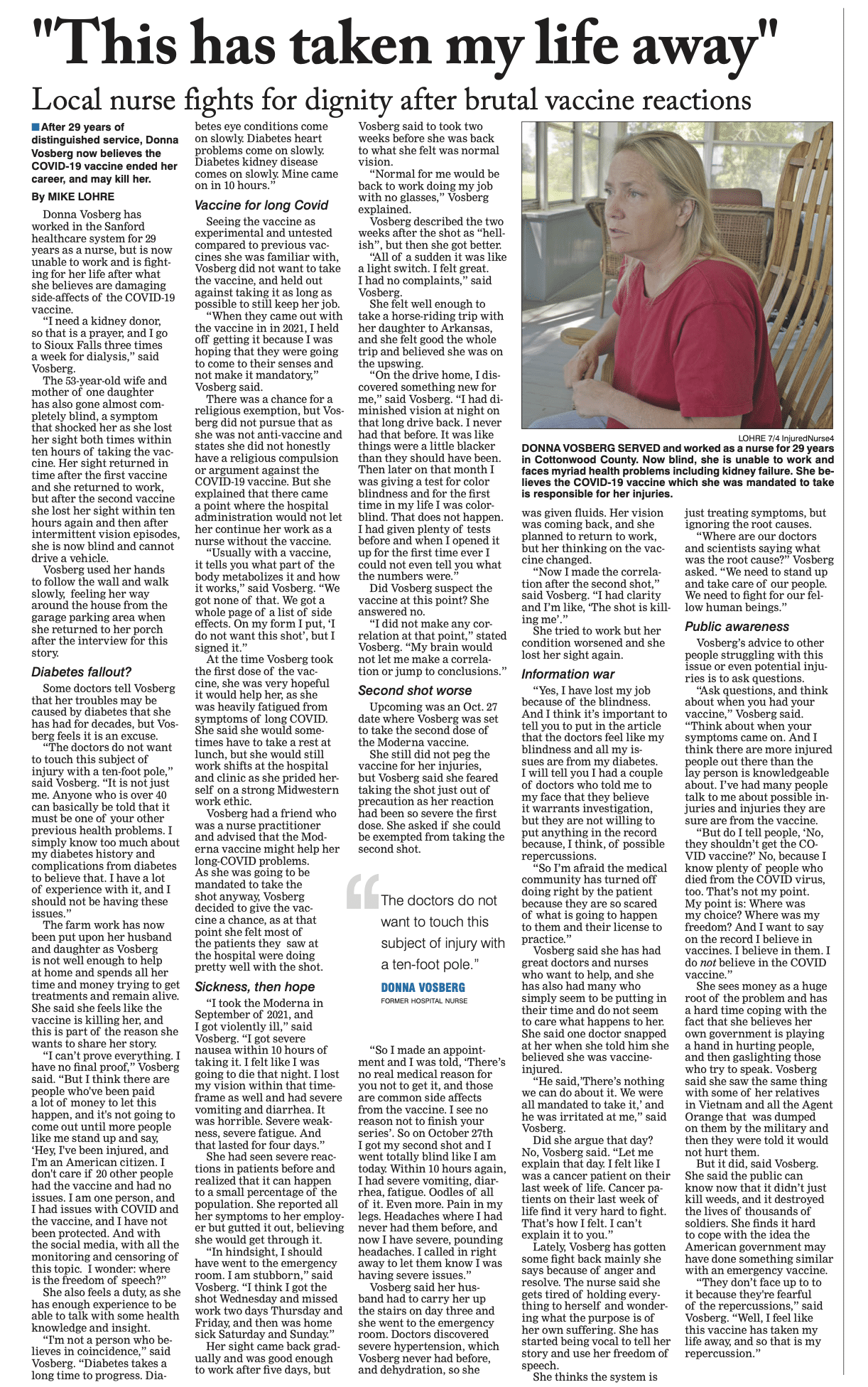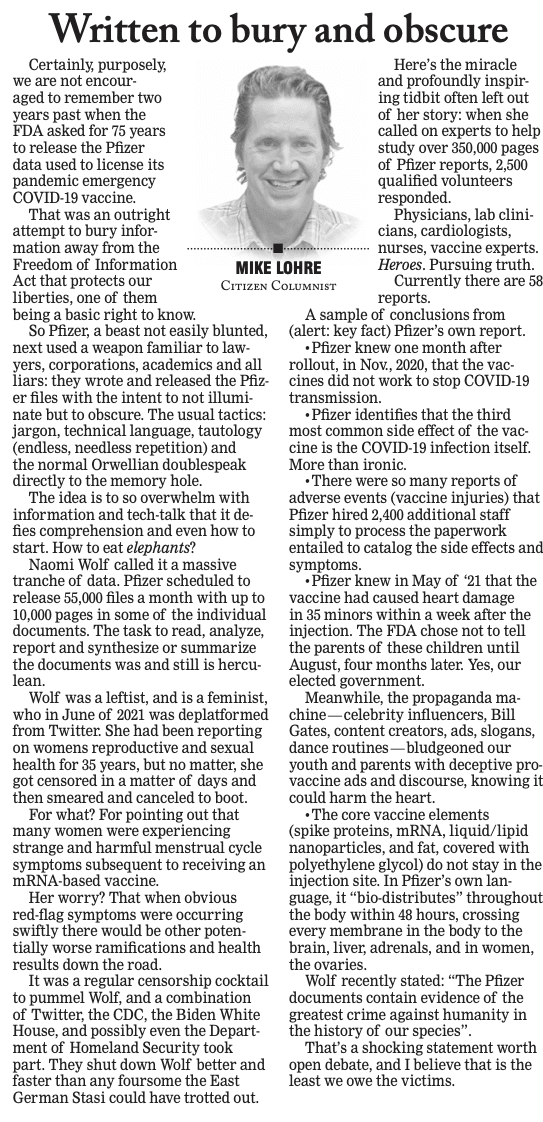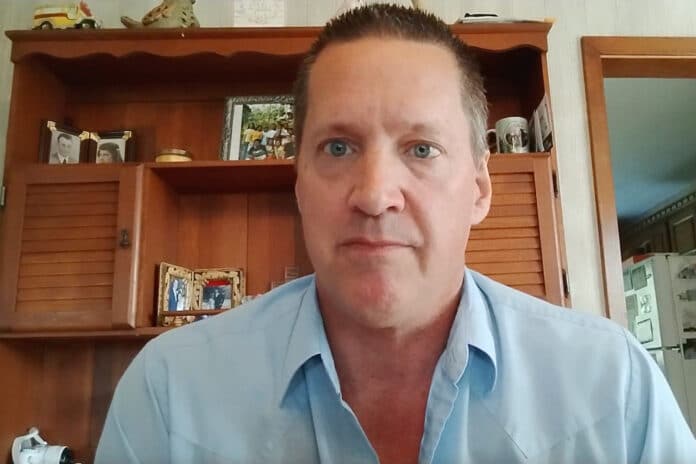A Minnesota reporter resigned after the newspaper he worked for refused to print the harrowing story of a local nurse who was nearly killed by the COVID vaccine.
Mike Lohre was a senior English lecturer at Ohio State for 25 years until he moved back to his Minnesota roots and became a reporter for the Cottonwood County Citizen in Windom.
Lohre enjoyed his job and his co-workers, however, he recently resigned due to the newspaper’s refusal to print what Lohre considered to be an important story.
The story of Donna Vosberg
Lohre said people were telling him to interview Donna Vosberg, who worked as a nurse in Westbrook for 29 years: “… people had come up to me on the streets of Windom and around Cottonwood County saying … you really need to interview this woman. She has an incredible story.”
Lohre interviewed Vosberg at her farm, where she spoke for hours about what happened to her after she took the Moderna COVID vaccine.
“She was hesitant to take the vaccine, but she was not anti-vaccine,” Lohre explained.
In recounting her story, Lohre said, “the way she described it, she eventually was going to have to take the vaccine to keep her job as tens of thousands of other people have been in the same situation.”
However, “within 12 hours of taking the first shot, she went temporarily blind … She knew as a nurse that some people, a small percentage of people can have an adverse reaction to a vaccine. She thought perhaps she was just one of them, but it was four days before she got her sight back and could return to work.”
Lohre also detailed how Vosberg “asked her employer if she could not take it because she had had such severe reactions to the first shot.”
Vosberg reluctantly took the second COVID vaccine because “the doctor they sent her to said, there’s no medical reason that you can’t take the second dose.”
Vosberg took the second dose because she would lose her job if she refused, as Lohre explained in his story. The second time, Vosberg’s reaction was much worse: she went blind—permanently this time—and her condition forced her to quit her nearly 30-year career as a nurse, Lohre said.
“She is definitely fighting for her life and she needs a kidney transplant to live. So she goes for dialysis, two or three days a week. And it’s just basically trying to hang on,” he added.

Newspaper refuses to publish Donna’s story
Lohre said that despite all of the time he spent on Vosberg’s story—and the strange silence from her employer—the newspaper wouldn’t publish his story.
“I have respect for the owner and for my editor, they’ve been wonderful people to me in many ways. But I advocated for the story and they, basically the owner told me that it was bad journalism and that it was too opinionated,” Lohre recalled.
However, Lohre said that he was trying to make a reasonable argument.
“It’s third-person objective news reporting. I tried to contact the hospital, the media people, the administrators and I couldn’t get any reply to do it two-sided and I said after you wait for weeks and go to them personally and they won’t answer, I think you have to say that they don’t have any comment and to me, that doesn’t preclude that you don’t let the average citizen tell their story and then just let people judge for themselves,” Lohre explained.
He also pointed out how that was part of what he taught as an English professor for 25 years. “I taught critical thinking and argument. I taught journalism. And I mean, the purpose of it, in my opinion, is to let people decide for themselves. I believe that’s the reporter’s job.
“And then if authoritative sources don’t want to talk to you, you have to follow up and do a series. That’s what I advocated. I said, let’s run her story. Then let’s go out and get other opinions. Let’s get other viewpoints. What are the treatments for vaccine injuries? How can we know that the new COVID vaccines that are out now this fall are safe? What has changed? What hasn’t? Just ask objective questions, go out and do a series,” Lohre continued.
The publisher of the Cottonwood County Citizen, Trevor Slette, confirmed to Alpha News the story wasn’t published. It was “not a balanced story,” according to Slette. “I wanted to hear from the clinic or the hospital to see it from the other side,” Slette added.
Ultimately, Lohre resigned his position with the paper.
“I understood I don’t own the paper. I’m not in control of it. I can be wrong about things, but I handed in my resignation letter. I just knew I couldn’t work there anymore because you can’t feel like a coward to yourself,” Lohre explained.

More than opinion: When data indicates a bigger issue
According to Lohre, the story was a lot more than just his opinion or an unbalanced story.
“I just felt in my conscience like, we can’t do this to people. I did over 20 hours of research in and around the subject. I wrote a column on the Pfizer data and reports that I felt like, this isn’t my opinion,” Lohre said. “This is Pfizer’s own data that showed that they had to hire over 2,000 people in their study just to deal with the people in the vaccine injuries, to deal with all the injury claims that they had. That’s their own data and study. What that indicates is that there are likely tens of thousands of people out there who have vaccine injuries.”
Lohre said he was drawn to the story because of his own personal experience of suffering from a traumatic brain injury.
“I know what it’s like to have an invisible injury and people don’t believe you because they can’t see it and they can’t feel your symptoms. They just, a lot of people, and this happened to me at Ohio State, they just ignore it. They think you’re making it up,” Lohre said. “And so I guess maybe I have a special empathy for that situation where you’re saying that you’re injured from something and people just flat out won’t believe you.”


















